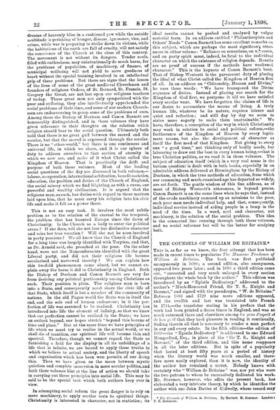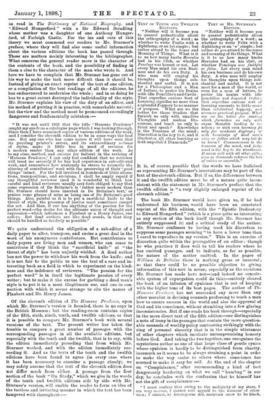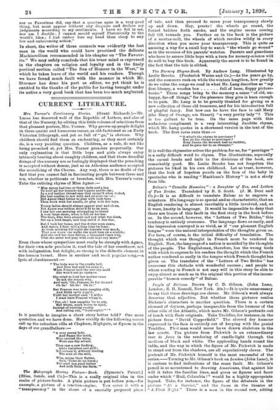THE COUNSELS OF WILLIAM DE BRITAINE.*
THIS is, as far as we know, the first attempt that has been made in recent times to popularise The Humane Prudence of William de Britaine. The book was first published anonymously in 1680; a second edition, also anonymous, appeared two years later ; and in 1686 a third edition came out, "corrected and very much enlarged in every section throughout the whole book by the author." This edition was introduced by an "Epistle Dedicatory," addressed to the author's "Much-Honoured Friend, Sir T. S., Knight and Baronet," and signed with the pseudonym, "W. de Britaine." Between 1686 and 1729 nine more editions appeared, and the twelfth and last was translated into French in 1744,—the translator stating in his preface that the work had been printed a dozen times in England, and was so much esteemed there and elsewhere among lea gens d'esprit et de bon gold that they took pleasure in reading it continually, finding therein all that is necessary to render a man perfect in any and every estate. In the fifth edition—the edition of 1689—the "Epistle Dedicatory" is addressed to one Edward Hungerford, Esq., in place of the "Sir T. S., Knight and Baronet," of the third edition, and this name reappears in all the later editions. But in spite of a popularity that lasted at least fifty years at a period of history when the literary world was much smaller, and there- fore more easily explored, than it is now, the identity of the author has remained a secret. Nobody knows with certainty who "William de Britaine" was, nor yet who were the two patrons to whom he successively dedicated his work. Mr. Stnrmer, however, who edits the present book, has elaborated a very intricate theory, by which he identifies the author with one John Davies of Kidwelly, whose record may • The Counsels of William do Britain.. By Herbert H. Stunner. London I F. E. Robinson.
be read in The Dictionary of National Biography, and "Edward Hungerford " with a Sir Edward Stradling
whose mother was a daughter of one Anthony Hanger. ford, of Farleigh Castle. For the ins and outs of this
theory we must commend our readers to Mr. Sturmer's preface, where they will find also some useful information about the various editions the book has passed through.
These are matters mainly interesting to the bibliographer. What concerns the general reader more is the character of the contents of the book, and the possibility of finding in them a clue to the character of the man who wrote it And here we have to complain that Mr. Stunner has gone out of his way to make the task more difficult than it should be.
Instead of giving an exact reprint of the text of one edition, or a compilation of the best readings of all the editions, he has endeavoured to modernise the whole ; and in so doing he has to a great extent destroyed the individuality of the style.
Mr. Sturmer explains his view of the duty of an editor, and his method of putting it in practice, with remarkable naïveté; but the view and the method must be pronounced exceedingly dangerous and fundamentally mistaken :—
" It was not until 1895 that the title Humane Prudence' ;Aught my eye from a catalogue page which I was looking through. Since then I have examined copies of various editions of the work, and I consider the eleventh edition to be in some ways the best one. But any one who has come across it will have seen that its puzzling printer's errors, and its extraordinary mdange of styles, make it little less in need of revision for a modern reader than any other edition of the work. As to my aims, method, and success (or failure) in the revising of 'Humane Prudence,' I can only feel confident that no reviewer will treat me severely if he has had experience in sub-editorial work, and remembers how anxiously he strove to reconcile the altering of contributors' work with the preserving of their good things' intact. For the toil involved in hundreds of little altera- tions, transpositions, and excisions, I shall be amply repaid if any thoughtful reviewer (and it is wonderful to think how careful and kind reviewers usually are) feels obliged to say that some expression of De Britaine's is rather more modern than Mr. Sturmer should have inserted in De Britaine's text,' or praises some phrase of mine as being one of De Britaine's good things. Also, painful as it is to put a sacrificial knife to the throat of style, the presence of justice must sometimes compel the act. And then, if one has anything of the passion for the perfect word—the desire for the ultimate union of thought and expression—which influences a Flaubert or a Henry James, one suffers. But dead authors are like dead creeds, in that they should be handled as tenderly as possible."
We quite understand the obligation of a sub-editor of a daily paper to alter, transpose, and excise a great deal in the work of his anonymous contributors. But contributors to daily papers are living men and women, who can cease to contribute if they think the "sacrificial knife" at "the throat of style" has been unjustly wielded. A dead author has not the power to withdraw his work from the knife ; and it is not fair to the public to use the text of a rare and in- teresting book as a field in which to experiment on the kind- ness and the indolence of reviewers. "The passion for the perfect word" is in itself the legitimate passion of every writer; but to make it the excuse for garbling a dead man's style is to put it to a most illegitimate use, and one in con- nection with which it seems strange to cite the names of Flaubert and Mr. Henry James.
Of the eleventh edition of The Humane Prudence, upon which Mr. Sturmer's version is founded, there is no copy in the British Museum; but the reading-room contains copies of the fifth, sixth, ninth, tenth, and twelfth editions, so that it is possible to compare Mr. Sturmer's book with several versions of the text. The present writer has taken the trouble to compare a great number of passages with the eorresponding passages in all the available editions, but especially with the tenth and the twelfth, that is to say, with the edition immediately preceding that from which Mr. Sturmer worked, and with the edition immediately suc- ceeding it. And as the texts of the tenth and the twelfth editions have been found to agree (in every case where it has been necessary to examine a passage closely), we may safely assume that the text of the eleventh edition does not differ much from either. A passage from the first section of the book "On Study," which we give in the words of the tenth and twelfth editions side by side with Mr.
Sturmer's version, will enable the reader to form an idea of the tactless and irritating manner in which the text has been tampered with throughout :—
treasure of the mind, and judg- merd is the key to its storehouse. It mixes well with all other gifts ; even as diamonds enhance the hue of rubies or emeralds."
It is, of course, possible that the words we have italicised as representing Mr. Stunner's innovations may be part of the text of the eleventh edition. Bat if so, the differences between it and the twelfth edition must be of a nature quite incon- sistent with the statement in Mr. Sturmer's preface that the
twelfth edition is "a very slightly enlarged reprint of the eleventh edition."
The book Mr. Starmer would have given us, if he had understood his business, would have been an annotated reprint of the fifth edition, with the "Epistle Dedicatory to Edward Hungerford" (which is a piece quite as interesting as any section of the book itself though Mr. Sturmer has entirely suppressed it) and a critical study of the author.
Mr. Sturmer confesses to having used his discretion to suppress some passages seeming "to have a lower tone than I cared to reproduce in my version." This is an exercise of discretion quite within the prerogative of an editor ; though he who practises it does well to tell his readers where he
has omitted passages, and to indicate, as far as possible, the nature of the matter omitted. In the pages of William de Britaine there is nothing gross or immoral ; so that there could be no possible objection to giving information of this sort in notes; especially as the excisions Mr. Sturmer has made have not—(and indeed no conceiv-
able system of expurgation could do this)—entirely cleared the book of an. infusion of cynicism that is out of keeping with the higher tone of its best pages. The author of The Humane Prudence has not succeeded any more than any other moralist in devising counsels professing to teach a man how to ensure success in the world and also the approval of God and his conscience, without stumbling into a few glaring inconsistencies. But if one reads his book through—especially in the more direct text of the fifth edition—one distinguishes a note of irony in the passages that contain the more question- able counsels of worldly policy contrasting strikingly with the ring of personal sincerity that is in the simple utterances of other chapters which inculcate uncompromising honesty before God. And taking the two together, one recognises the mysterious author as one of that large class of gentle cynics whose cynicism is hardly to be distinguished from charity, inasmuch as it seems to be always straining a point in order to make the way easier to others where conscience has scorned to make it easy for self. At the end of the chapter on "Complaisance," after recommending a kind of tact dangerously bordering on what we call " humbug " in our day, he concludes with the confession that he himself has not the gift of complaisance :—
" I must confess that owing to the malignity of my stars, I am very morose, I cannot suit myself to the humour of other men; I cannot, as Anaxagoras did, maintain snow to be black, TEXT OF TENTH AND TWELFTH EDITIONS.
"Neither will it become you to quarrel pedantically about the orthography of a word ; as whether to write Foelix with a diphthong, or an (e) simple ; but rather attend to the Sense and Meaning of Things. What is it to us how many knobs Hercules had in his Club, or whether Penelope was honest or not. Let every Man mind his own Busi- ness and do his own Duty. A wise man will employ his thoughts upon things sub- stantial and useful. It is not for a Philosopher and a Man of Letters, to pester his Brains with idle Punctilio's and Cavils : That superfine curious Sort of Learning signifies no more than a splendid Foppery to no manner of purpose. What are we the better for those Studies that furnish us only with unactive Thoughts and useless Dis- courses, and teach us only to think and speak ? Knowledge is the Treasure of the mind ; Discretion is the key to it, and it illustrates all other learning as doth tuipolish'd Diamonds." Tarr OF Ma. STURDIER'S EDITION.
"Neither will it become you to quarrel pedantically about the orthography of a word ; as whether to write Felix with a diphthong or an 'e' simple; but rather do you attend to the sense and meaning of the things. What is it to us how many knobs Hercules . had on his club, or whether Penelope was faithful or false. Let every man mind his own business and do his own duty. A wise man will employ his thoughts upon things sub- stantial and useful. It is not meet for a man of the world, or even for a man of letters, to pester his brains with idle punctilios and disputed trifles ; that superfine curious sort of learning amounts to little more than intellectual foppery, and serves no practical purpose. What are we the better for reading which furnishes us only with vague thoughts leading to in- action; or with vain learning fit only for academic displays ; or with knowledge of dead men's vices or follies which may but do us harm? Common-sense is the
nor as Favorinus did, say that a quartan ague is a very good thing, but must appear without any disguise and declare my judgments according to my sentiments. I have no Sol in me, nor am I ductile ; I cannot mould myself Platonically to the world's Idea ; I had rather lose my head than stoop to any low and unbecoming action."
In short, the writer of these counsels was evidently the last man in the world who could have practised the delicate Machiavellism recommended in his chapter on "The Favour- ite." We may safely conclude that his truer mind is expressed in the chapters on religion and loyalty and in the finely poetical section called "The Sun of Honour in the West," in which he takes leave of the world and his readers. Though we have found much fault with the manner in which Mr. Sturmer has done his part as editor, we yet think he is entitled to the thanks of the public for having brought under its notice a very good book that has been too much neglected.












































 Previous page
Previous page